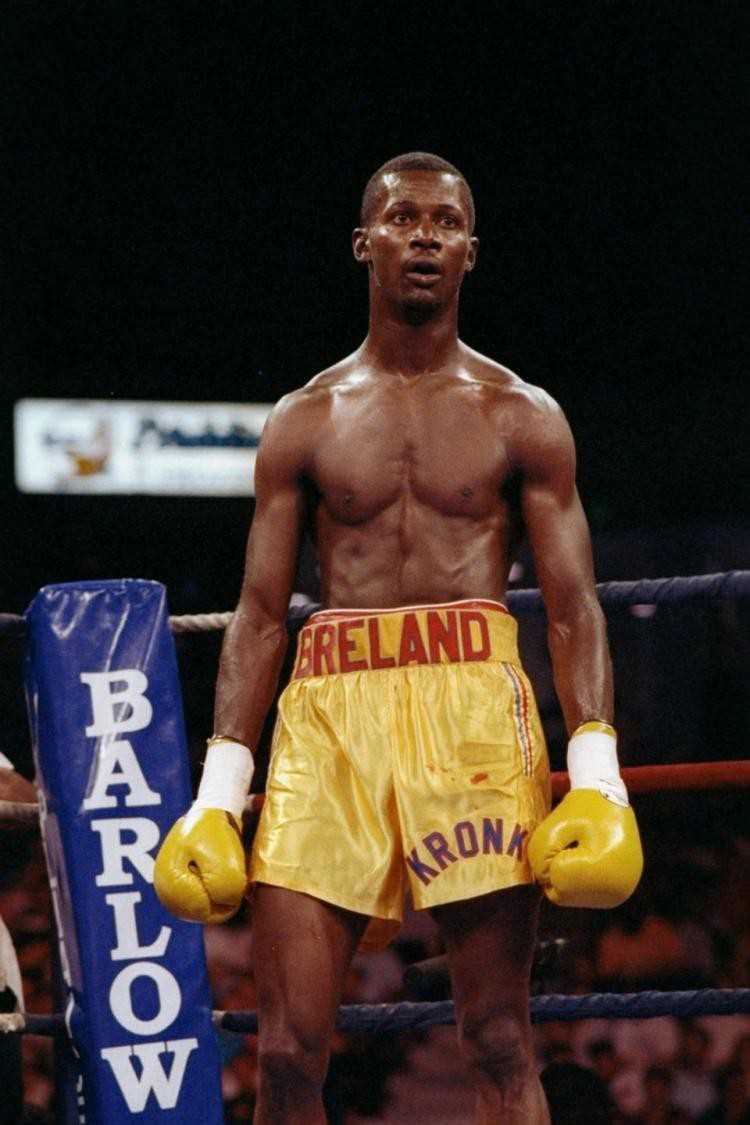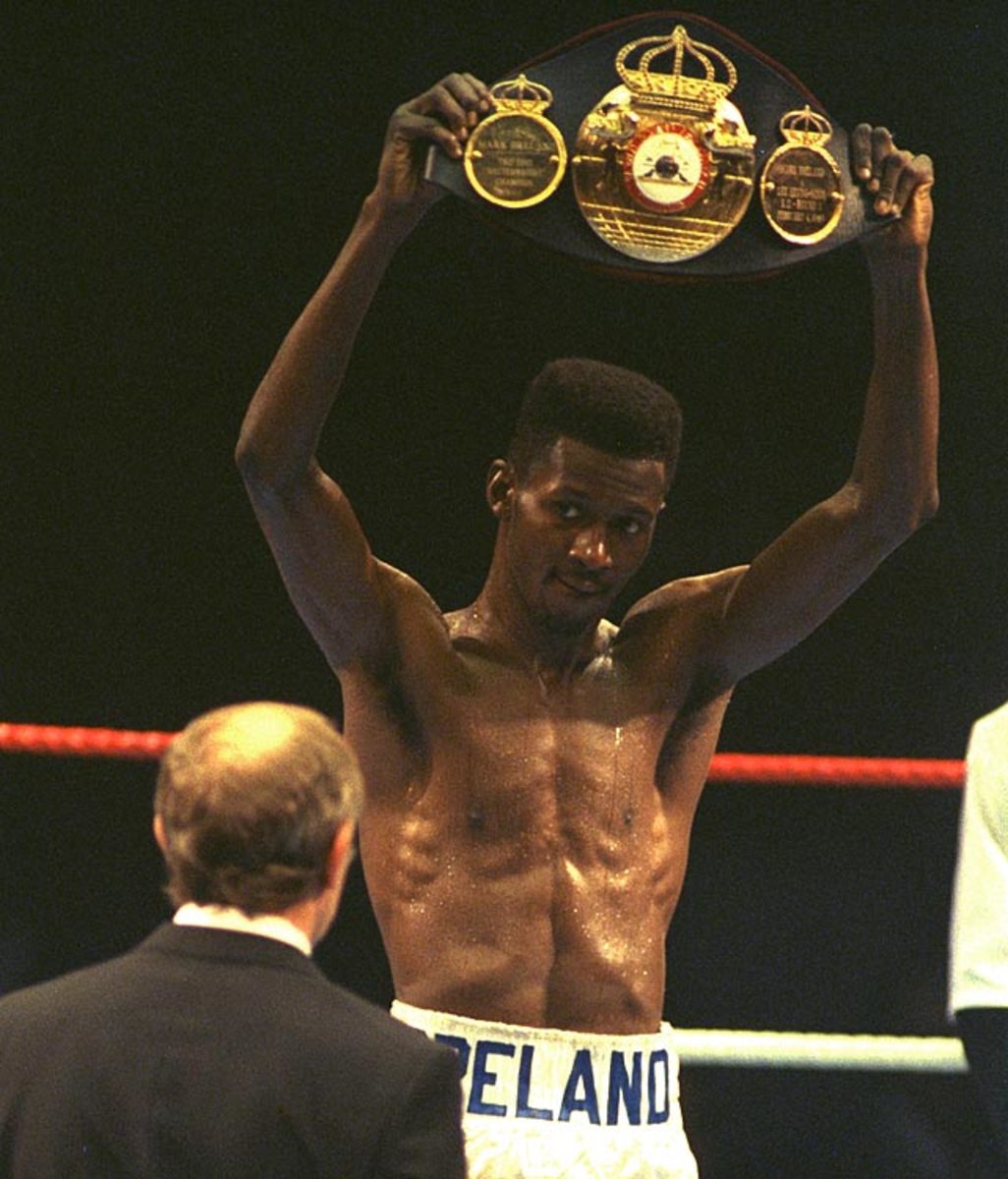Is the story of Mark Breland, the "King" of amateur boxing in the 1980s, a tale of unrealized potential, or a testament to a career defined by both triumph and unexpected turns? Breland's journey, from Olympic gold medalist to world champion and then to a controversial role in the career of Deontay Wilder, reveals a complex narrative of skill, circumstance, and the unpredictable nature of the fight game.
The name Mark Breland resonates with boxing enthusiasts, conjuring images of a dazzling amateur career and a promising professional ascent. Yet, the path of the former WBA welterweight champion is paved with as many questions as it is with accolades. His career spanned over 12 years, from 1984 to 1997, a period marked by both dazzling displays of technical brilliance and the harsh realities of a sport that demands not only talent but also resilience. He was a man who, as John Condon, the Garden's president for boxing, said, had "the makings of a truly great fighter," even being considered "the best amateur I've ever seen." Teddy Brenner, a veteran matchmaker, went further, suggesting Breland might have even had a better shot than Sugar Ray Leonard as a pro, citing his size advantage, akin to that of a Robinson. The world certainly seemed to believe in him, with many hailing Breland as the most heralded American boxer prior to the 1984 Olympics, as much for his acting career as his boxing record. He was the embodiment of potential, a golden boy destined for greatness.
| Category | Details |
|---|---|
| Full Name | Mark Breland |
| Date of Birth | May 11, 1963 |
| Birthplace | Brooklyn, New York, USA |
| Nationality | American |
| Stance | Orthodox |
| Amateur Record | 110-1 |
| Professional Record | 35-3-1 (20 KOs) |
| Weight Division | Welterweight, Light Middleweight |
| Titles Held | WBA Welterweight Champion |
| Notable Achievements | 1984 Olympic Gold Medalist, 1982 USAABF Boxer of the Year, Rated #1 Amateur Welterweight in the World by AIBA in 1984 |
| Years Active | 1984-1997 (Professional) |
| Training | Later became a trainer, notably for Deontay Wilder. |
| Reference | BoxRec Profile |
Breland's ascent began in the amateur ranks, where he was a phenomenon. His record of 110 wins against a single loss speaks volumes. In the 1984 Olympics, held in Los Angeles, he secured the gold medal, cementing his status as a national hero. This victory, alongside the achievements of other future boxing legends like Pernell Whitaker and Evander Holyfield, helped to galvanize the sport within America and beyond. The Smithsonian Museum for African American History and Culture in Washington, D.C. recognized his contributions, displaying an honorary picture of Breland, recognizing his achievements. Beyond the accolades, Breland's skills were undeniable. He was awarded the 1982 boxer of the year by USAABF and rated #1 amateur welterweight in the world by AIBA in 1984. The potential was there, the talent undeniable.
- Discover Funky Fashion Bold Styles Unique Finds
- Al Joyners Life From Flo Jo To Alisha Biehn Family Explained
However, the transition to the professional ranks wasn't as smooth as many had anticipated. While Breland enjoyed a successful career, winning the WBA welterweight title, he never quite reached the heights that his amateur pedigree suggested he could. He held the title for a time, but his reign was cut short by Marlon Starling, who defeated him in a rematch. In 1987, Starling knocked him out in the 11th round to win the WBA welterweight title, a defeat that underscored the brutal nature of professional boxing. Starling would go on to lose his title in controversial fashion to Tomas Molinares, showing that Breland was facing the best of the best.
A key element of the ongoing narrative is Breland's role in the career of Deontay Wilder. Breland served as Wilder's trainer, a partnership that resulted in Wilder becoming a world champion. In a surprising turn of events, Breland stopped a fight in Wilder's corner against Tyson Fury, a decision that ultimately led to the end of their professional relationship. This decision, driven by Breland's concern for Wilder's safety, sparked a public war of words, highlighting the complexities of the trainer-fighter dynamic. In an interview with "The Fight is Right," Breland shared his perspective on the accusations leveled against him by his former fighter. He hasn't been a man of many words, yet the sentiment is understood.
The relationship between Wilder and Breland has been analyzed from various angles. Some boxing observers, like those on social media platforms, believe Breland's decision was a courageous act of a trainer who cared for his fighters well-being. They also cite it as a crucial turning point, as they see Wilder's subsequent career choices, including the people he surrounded himself with, as detrimental to his progress. The perception that Wilder made a mistake by severing ties with Breland is a common theme in the boxing community, particularly among those who value experience and loyalty. The results, according to many analysts, are more than telling. The criticisms directed at Wilders new camp are numerous.
- Nikola Mekti Wimbledon Champion Croatian Tennis Star
- Artists Stories John Bramblitt More Art World Insights
The discussion surrounding Breland's legacy often includes comparisons to other greats. The debates are common, with discussions on the relative merits of fighters like Sugar Ray Leonard and Thomas Hearns. While Breland's career may not have reached the same heights as those of his contemporaries, his impact on the sport is undeniable. The analysis of boxing matches often include names like Duran and Benitez, with comparisons of their records and their opponents. Such reflections inevitably leads to considerations about Breland's own standing in the pantheon of boxing greats.
Beyond the ring, Breland is admired for his humility, sportsmanship, and positive values. He is a beloved figure in the boxing community, often praised for his character and the respect he commands. His contributions to the sport extend beyond his fighting career, encompassing his mentorship and his commitment to the ethical conduct of the sport.
Breland's story is a microcosm of the sport of boxing itself: filled with potential, marked by triumph, and yet perpetually subject to the unpredictable forces that shape the trajectories of even the most talented individuals. His journey is one of both achievement and what-ifs. The debates over Wilder, the Olympic gold medal, the WBA title, the wins and the losses they all contribute to the complex portrait of a boxer who, despite not reaching the heights some predicted, left an indelible mark on the sport.



Detail Author:
- Name : Mr. Mortimer Bradtke V
- Username : feeney.adelia
- Email : pmetz@dietrich.com
- Birthdate : 1974-02-02
- Address : 4011 Mertie Roads Elroyland, CT 72721-4265
- Phone : +1 (480) 246-5077
- Company : Tromp, Farrell and Bergstrom
- Job : Forestry Conservation Science Teacher
- Bio : Quae porro nostrum voluptate minima ut in soluta. Doloribus pariatur corporis provident mollitia qui omnis voluptatibus. Sed officiis sequi autem sit et.
Socials
linkedin:
- url : https://linkedin.com/in/maximus8937
- username : maximus8937
- bio : Voluptatem est occaecati sit sed amet et.
- followers : 1614
- following : 2076
facebook:
- url : https://facebook.com/mwindler
- username : mwindler
- bio : Sunt et sit libero impedit nihil.
- followers : 4711
- following : 2018
instagram:
- url : https://instagram.com/windler1998
- username : windler1998
- bio : Vel laboriosam similique rerum ullam quo iste ut. Enim illo fugit accusamus et et autem aspernatur.
- followers : 1227
- following : 22
twitter:
- url : https://twitter.com/mwindler
- username : mwindler
- bio : Dolorum ea aspernatur facere eius. Ipsum modi eveniet in eos necessitatibus sed dolores odit. Qui sunt delectus fugit eos nesciunt harum nisi sed.
- followers : 5603
- following : 1733